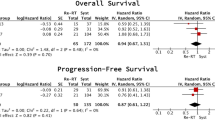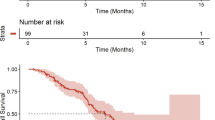Opinion statement
Meningiomas are the most common intracranial tumors and the majority of cases is curable by surgical resection. Incompletely resected tumors and tumors with signs of increased malignancy (WHO grade II and III tumors) are prone to recur. In meningiomas relapsing after surgical resection and after exhaustion of radiotherapeutic options, drug therapy is to be considered. A variety of drugs has been studied in meningiomas, including hydroxyurea, temozolomide, irinotecan, interferon-alpha, mifepristone, octreotide analogues, megestrol acetate, bevacizumab, sunitinib, vatalinib, imatinib, erlotinib, and gefitinib. Unfortunately, most of these agents have shown no or very limited activity against meningiomas and cannot be recommended for clinical use. Compounds with antiangiogenic properties, i.e., bevacizumab, sunitinib, and vatalinib have shown potential efficacy in uncontrolled studies and should be investigated further, ideally in randomized clinical trials. Emerging clinical studies will evaluate novel medical treatment approaches including the tetra-hydroisoquinoline alkaloid trabectedin (European Organisation for Research and Treatment of Cancer (EORTC) phase II trial 1320) and SMO or AKT inhibitors in molecularly selected cases.
Similar content being viewed by others
References and Recommended Reading
Papers of particular interest, published recently, have been highlighted as: •• Of major importance
Wohrer A, Waldhor T, Heinzl H, Hackl M, Feichtinger J, Gruber-Mosenbacher U, et al. The Austrian Brain Tumour Registry: a cooperative way to establish a population-based brain tumour registry. J Neurooncol. 2009;95(3):401–11.
Woehrer A, Hackl M, Waldhor T, Weis S, Pichler J, Olschowski A, et al. Relative survival of patients with non-malignant central nervous system tumours: a descriptive study by the Austrian Brain Tumour Registry. Br J Cancer. 2014;110(2):286–96.
Kaley T, Barani I, Chamberlain M, McDermott M, Panageas K, Raizer J, et al. Historical benchmarks for medical therapy trials in surgery- and radiation-refractory meningioma: a RANO review. Neuro Oncol. 2014;16(6):829–40. Thorough review and evaluation of published studies on drug therapy of meningiomas including definition of benchmark efficacy endpoints.
Baumgarten P, Brokinkel B, Zinke J, Zachskorn C, Ebel H, Albert FK, et al. Expression of vascular endothelial growth factor (VEGF) and its receptors VEGFR1 and VEGFR2 in primary and recurrent WHO grade III meningiomas. Histol Histopathol. 2013;28(9):1157–66.
Nassehi D, Dyrbye H, Andresen M, Thomsen C, Juhler M, Laursen H, et al. Vascular endothelial growth factor a protein level and gene expression in intracranial meningiomas with brain edema. APMIS. 2011;119(12):831–43.
Preusser M, Hassler M, Birner P, Rudas M, Acker T, Plate KH, et al. Microvascularization and expression of VEGF and its receptors in recurring meningiomas: pathobiological data in favor of antiangiogenic therapy approaches. Clin Neuropathol. 2012;31(5):352–60.
Preusser M, Berghoff AS, Hottinger AF. High-grade meningiomas: new avenues for drug treatment? Curr Opin Neurol. 2013;26(6):708–15.
Preusser M, Spiegl-Kreinecker S, Lotsch D, Wohrer A, Schmook M, Dieckmann K, et al. Trabectedin has promising antineoplastic activity in high-grade meningioma. Cancer. 2012;118(20):5038–49.
Sahm F, Bissel J, Koelsche C, Schweizer L, Capper D, Reuss D, et al. AKT1E17K mutations cluster with meningothelial and transitional meningiomas and can be detected by SFRP1 immunohistochemistry. Acta Neuropathol. 2013;126(5):757–62.
Brastianos PK, Horowitz PM, Santagata S, Jones RT, McKenna A, Getz G, et al. Genomic sequencing of meningiomas identifies oncogenic SMO and AKT1 mutations. Nat Genet. 2013;45(3):285–9. Identification of oncogenic mutations with potential relevance as drug targets in meningiomas.
Clark VE, Erson-Omay EZ, Serin A, Yin J, Cotney J, Ozduman K, et al. Genomic analysis of non-NF2 meningiomas reveals mutations in TRAF7, KLF4, AKT1, and SMO. Science. 2013;339(6123):1077–80. Identification of oncogenic mutations with potential relevance as drug targets in meningiomas.
Raizer JJ, Grimm SA, Rademaker A, Chandler JP, Muro K, Helenowski I, et al. A phase II trial of PTK787/ZK 222584 in recurrent or progressive radiation and surgery refractory meningiomas. J Neurooncol. 2014;117(1):93–101. Clinical study reporting potential activity of vatalanib.
Kaley TJ, Wen P, Schiff D, Ligon K, Haidar S, Karimi S, et al. Phase II trial of sunitinib for recurrent and progressive atypical and anaplastic meningioma. Neuro Oncol. 2015;17(1):116–21. Clinical study reporting potential activity of sunitinib.
Lou E, Sumrall AL, Turner S, Peters KB, Desjardins A, Vredenburgh JJ, et al. Bevacizumab therapy for adults with recurrent/progressive meningioma: a retrospective series. J Neurooncol. 2012;109(1):63–70. Restrospective study reporting potential activity of bevacizumab.
Nayak L, Iwamoto FM, Rudnick JD, Norden AD, Lee EQ, Drappatz J, et al. Atypical and anaplastic meningiomas treated with bevacizumab. J Neurooncol. 2012;109(1):187–93. Retrospective study reporting potential activity of bevacizumab.
Nunes FP, Merker VL, Jennings D, Caruso PA, di Tomaso E, Muzikansky A, et al. Bevacizumab treatment for meningiomas in NF2: a retrospective analysis of 15 patients. PLoS One. 2013;8(3), e59941.
Puchner MJ, Hans VH, Harati A, Lohmann F, Glas M, Herrlinger U. Bevacizumab-induced regression of anaplastic meningioma. Ann Oncol. 2010;21(12):2445–6.
Schiff D, Lee EQ, Nayak L, Norden AD, Reardon DA, Wen PY. Medical management of brain tumors and the sequelae of treatment. Neuro Oncol. 2015;17(4):488–504.
Compliance with Ethics Guidelines
Conflict of Interest
Matthias Preusser declares the receipt of honoraria, research support (unrestricted grants), and travel support (scientific meetings) from Roche, GlaxoSmithKline, Böhringer-Ingelheim, and Bristol-Myers Squibb.
Christine Marosi declares no conflict of interest.
Human and Animal Rights and Informed Consent
This article does not contain any studies with human or animal subjects performed by the authors.
Author information
Authors and Affiliations
Corresponding author
Additional information
This article is part of the Topical Collection on Neuro-oncology
Rights and permissions
About this article
Cite this article
Preusser, M., Marosi, C. Antiangiogenic Treatment of Meningiomas. Curr Treat Options Neurol 17, 29 (2015). https://doi.org/10.1007/s11940-015-0359-0
Published:
DOI: https://doi.org/10.1007/s11940-015-0359-0




